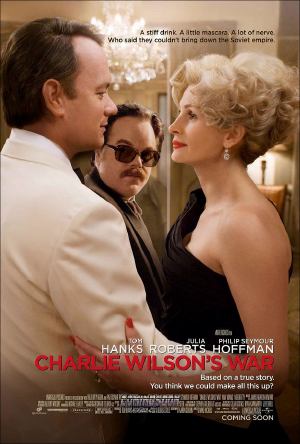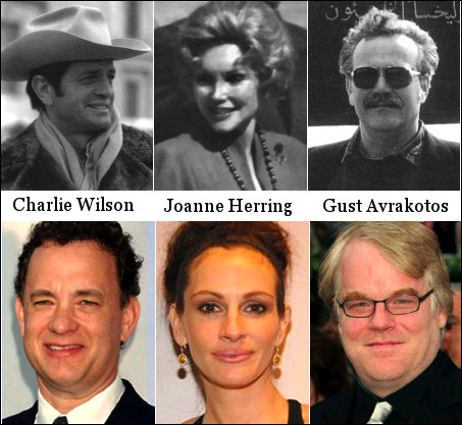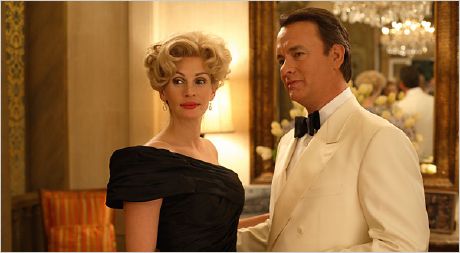Adil Najam
 I saw Charlie Wilson’s War, the movie featuring Tom Hanks and Julia Roberts, today.
I saw Charlie Wilson’s War, the movie featuring Tom Hanks and Julia Roberts, today.
Long-time readers of this blog know that I am a huge fan of the book by the same name on which movie is based. I enjoyed the movie… a lot. Judging by their reactions and response so did most of the others in the theater (nearly all Americans). The applause, the oohs, the aahs, the gasps, and the laughs all came at the right spot. The movie, which has garnered 5 Golden Globe nominations, was good entertainment and its message was powerful and came across clearly.
Having said that, the movie was no where nearly as gripping as the book. To me – having grown up in Pakistan in the era and under the shadow of the Afghanistan war – the movie is to the book what water flowing from a tap is to the Niagara Falls. Please do not get me wrong. This is not a criticism of the movie. I have already said that it is a good movie. This is a compliment for the book, which is a great book.
So my advice to you is: Do go and see the movie and ask your friends to do so too. But, please read the book. Consider the movie to be no more than a trailer for the book.
There should be no doubt in anyone’s mind by now that I really like the book. In fact, within the very first week of launching this blog, I wrote not one but two posts on Charlie Wilson’s War. The first post was information about the (then) forthcoming movie and the second was about the book itself with excerpts about its context and some reviews. It has been one of my favorite gifts to give to students, colleagues and friends. So, obviously, I was looking forward to the movie.
 Only two days ago (before I saw the movie) I remarked, half-seriously, to a friend that in some ways this book simply cannot be converted into a movie. And maybe it should not have been. The book is way too nuanced. Way too intricate. Way too close to reality to ever turn into a movie. Popular movies have to cast wide nets. Their messages have to be clear. Their story-lines simple. The morality straightforward. Their message unambiguous. Charlie Wilson’s War (the book or the reality) was none of these things. Frankly speaking, I was afraid that in trying to make it so the movie would compromise the integrity of the true story of the Afghanistan War and of the US and Pakistan role in it that is told in the book.
Only two days ago (before I saw the movie) I remarked, half-seriously, to a friend that in some ways this book simply cannot be converted into a movie. And maybe it should not have been. The book is way too nuanced. Way too intricate. Way too close to reality to ever turn into a movie. Popular movies have to cast wide nets. Their messages have to be clear. Their story-lines simple. The morality straightforward. Their message unambiguous. Charlie Wilson’s War (the book or the reality) was none of these things. Frankly speaking, I was afraid that in trying to make it so the movie would compromise the integrity of the true story of the Afghanistan War and of the US and Pakistan role in it that is told in the book.
Luckily, the movie adopted the right approach by not even trying to capture all the nuances and all the intricate stories that are woven into the book. It could not have done them justice and therefore did not even try to. This, I think was wise. It tells only one stream of the stories that defines the book. The stream focused on Charlie Wilson. It tells that story well and probably that is the part of the story that best resonates with US audiences. But a movie could probably not even do full justice to Charlie Wilson, the man. Here, for example, is a glimpse of the real Charlie Wilson (and the real Joanne Herring):
There are other streams of stories in the book that movie barely hints at which are actually central to the book. The story of Gust Avrakotos, the CIA agent could have been a movie in itself. The story of the Israeli – Saudi – Egyptian connections to the Afghanistan war are just hinted at but are grippingly detailed in the book. Like Gust, the character of Joanne Herring (then Pakistan’s honorary Consul General in Houston) is central to the movie but does not come alive in its intricacies as it does in the book. The story of how complex the weapon development issue was seemed to have been lost. The Pakistan story- either the Zia ul Huq angle or the ISI angle – although detailed in the book are skipped in the movie. And most importantly, the Afghan Mujahideen are central characters in the book but only background visuals in the movie.
All of this, I think, is to be expected and not necessarily bad. But all of this is reason why people should also read the book. Go, watch the movie and let that whet your appetite for reading the book. The one thing you must not do is to assume that because you have seen the movie you know what the book is like, or even about. That is nearly never true and certainly not true in this case.
![]()
Of course, since I am rather close to the subject matter I found the little mistakes that some would not even notice to be annoying. For example, most vehicles in Pakistan are right-hand side drive not left-hand side drive as in the movie. The Old Presidency where Charlie Wilson met Zia-ul-Haq did not look anything like what it was depicted. The military advisers to Zia (who is not very well played by Om Puri) shown in the movie acted rather cartoonishly. The camels shot outside Peshawar might have been misplaced. Charlie Wilson’s interest in Afghanistan was never as straight-forward as the movie makes them out to be. The fact that the only Afghan Mujahideen group mentioned in Ahmad Shah Masood’s even though history and the book in question has far more detail of other groups. And the ending of the movie seemed to have internalized post 9/11 realities far more than was warranted and there is little evidence that either Charlie Wilson or Gust Avrakotos understood the ramifications as much as the movie seems to suggest.
All of that notwithstanding, and my reverence for the book as it is, I have to agree with the reviewer at the New York Times who write a glowing review of the movie:
Fun is this movie’s unlikely and persuasive motto. If it’s the best politically themed movie to come around in a while, that may be because the director, Mike Nichols, and the screenwriter, Aaron Sorkin, grasp that politics, for all its seriousness, is an essentially comic undertaking. Their film is never glib or flippant, but instead shows a lightness of touch and a swiftness of attack — 96 minutes to drink some cocktails, make some deals and send the Russians packing — that stand in welcome contrast to the plodding, somber earnestness of some recent movies I will tactfully refrain from naming.
Not that discretion is necessarily the better part of valor. And it’s hard to imagine a hero as indiscreet as Charlie Wilson, a Democrat who represented Texas’s Second Congressional District in the House of Representatives. Mr. Wilson, who retired from the House in 1996, is played with sly, rascally charisma by Tom Hanks. It is always a pleasure to see Mr. Hanks play against clean-cut type, and here he has the devilish smile of a middle-aged playboy who has woken up in a long-lost guilt-free sequel to “Bachelor Party” …
It’s quite a yarn, and the filmmakers relate it with clarity and verve. The film’s high spirits are inseparable from its sober purpose, which is to present a gentle corrective to the idea that American heroism resides only in square-jawed, melancholy stoicism. That has been the preferred post-9/11 stance, and there is some evident nostalgia in “Charlie Wilson’s War†for the simpler world of the 1980s, when the bad guys flew MIGs and American political life was perhaps a touch less sanctimonious.
But there is nonetheless a bracing, cheering present-day moral to be found in Charlie Wilson’s story, a reminder that high principles are not incompatible with the pleasure principle. The good guys are the ones who know how to have a good time, and who counter the somber certainties of totalitarianism with the conviction that fun is woven into the fabric of freedom.
At the risk of repeating myself, I do fear that my enthusiasm for the book might be mistaken for a lack of enthusiasm for the movie. It is not so. Let me end by repeating what I said at beginning of the post: “I enjoyed the movie… Do go and see the movie and ask your friends to do so too. But, please read the book. Consider the movie to be no more than a trailer for the book.”





















































Finally saw the movie yesterday. Interesting I must say. Some parts are more like a documentary than a movie. More was left to be desired on ‘action’ side.
Just curious. Does the book make any mention of the fact that the Communist government was the best government that Afghanistan has ever had–from the perspective of the (ok, hypothetical) Average Afghan man and woman?
Ignoring the many thousands (estimates range from 20-40K killed) of people rounded up and killed as enemies of the revolution by the Khalkis and Parchamis, the Communist government initiated a land-to-the-tiller program and mandated education for both boys and girls, among other unIslamic acts. Why do I say ignore the killings? Because the Afghan Mujahideen government and the Taliban did as bad if not worse without any positive act to offset it.
From Adil Najam’s review, I also get the impression the book and the movie make a deliberate attempt to ignore the fact that Gulbuddin Hekmatyar, now allied to Mullah Omar’s Taliban, was the biggest recipient of US military and financial assistance.
This was at the insistence of the ISI whose much-vaunted Afghan Desk (all Pathans of course) hated the Persian speaking Tajiks of Ahmad Shah Massoud. Incidentally, both Massoud and Hekmatyar were Pakistani clients since 1973 when Gen. Babar (then IGFC) set up the Afghan resistance cell out of his office.
Any mention of the massive corruption in the ISI? The systematic ‘leakage’ of arms and funds out of the pipeline? Of the amount of money Zia and Akhtar Abdur Rehman made out of the jihad?
Any mention of Zbigniew Brezinski’s admission that the US was actually financing operations against the Communist government BEFORE the Soviet invasion in order to suck the Soviets into their Vietnam? Of his comment that it was worth having a few Muslims ‘riled up’ in order to destroy the Soviet Union?
I picked up the book at an airport bookstore and leafed through it for a few minutes before deciding that it was too simplistic a portrayal of the war. Far too much American hoo-yah BS and a singular inability to understand the complexity of the issue. As an undergrad in the 1980s, I was also proud of the Afghan Mujahideen and Pakistan’s support of them. How stupid I was and look at what “Charlie Wilson’s War” has done to our country–with our willing complicity.
Yayyyyyy, Nail ’em Up
Finally a realist who gets it right. Nobody who says his whole life was *chasing pussy and killing communists* is a great fellow worth making heroic movies about. This guy was a pompous jerk who made a lot of very very big mistakes. I read that they did try to cover some of that in the movie but the *Texas socialite* didn’t like how it made her look so all of that was left on the cutting room floor.
Rambo, yeah right. Bimbo and James Bond wannabe, maybe.
Adil i agree with your analysis and comparison of book and the movie Charlie Wilson’s War.
Another technical mistake in movie: The uniform of Brig and Col are not accurate, e.g there are no red strips on the collars.
It would have been better if couple of active duty/in-service officers of Pak army were cast.
Even turban style of presidential waiters is not accurate.
The scene could have been shot in now women university housed in Zia’s presidential residence in Rawalpindi.
After watching the movie, I remembered the day my father (and rest of the family) bought AK47. I don’t remember why my family bought those guns and whether they needed it… I just hated the idea than and blame most of the violence in Pakistan to those guns brought into pakistan from Afghanistan after the war and selling them for food.